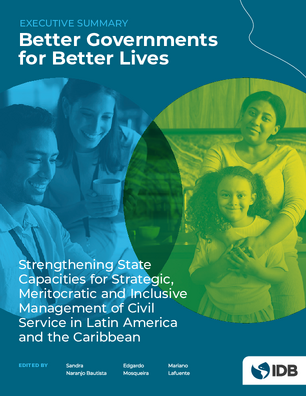Better Governments for Better Lives: Strengthening State Capacities for Strategic, Meritocratic, and Inclusive Management of Civil Service in Latin America and the Caribbean: Executive Summary
Date issued
Nov 2024
Subject
Human Capital;
Trust;
Public Service;
Public Sector;
Public Employment;
Good Governance;
Governance;
Labor Force;
Public Administration;
Corporate Governance;
Regulation;
Public Service Delivery
JEL code
D73 - Bureaucracy • Administrative Processes in Public Organizations • Corruption;
H10 - Structure and Scope of Government: General;
H11 - Structure, Scope, and Performance of Government;
H83 - Public Administration • Public Sector Accounting and Audits;
J45 - Public Sector Labor Markets;
N46 - Latin America • Caribbean;
P48 - Political Economy • Legal Institutions • Property Rights • Natural Resources • Energy • Environment • Regional Studies
Category
Learning Materials
In a context of fiscal constraints, citizen distrust, and accelerating technological change, the third edition of the regional civil service study, Better Governments for Better Lives, assesses the state of public service in Latin America and the Caribbean, highlighting progress and challenges over the past decade. The report focuses on three key questions What capacity do countries have to manage their civil service effectively? What are the main challenges and how can they be addressed? And what best practices can be adapted to promote an effective civil service? Despite some progress, such as gradual professionalization and the adoption of new technologies, regional progress has been slow and uneven, with modest growth in the global average index. The study underscores the importance of strategic, merit-based and inclusive human resource management as a key pillar for strengthening state capacity, improving public service delivery and enhancing citizen trust. It also proposes a roadmap with specific recommendations to consolidate a more efficient and equitable civil service capable of addressing the region's structural challenges.
NO



